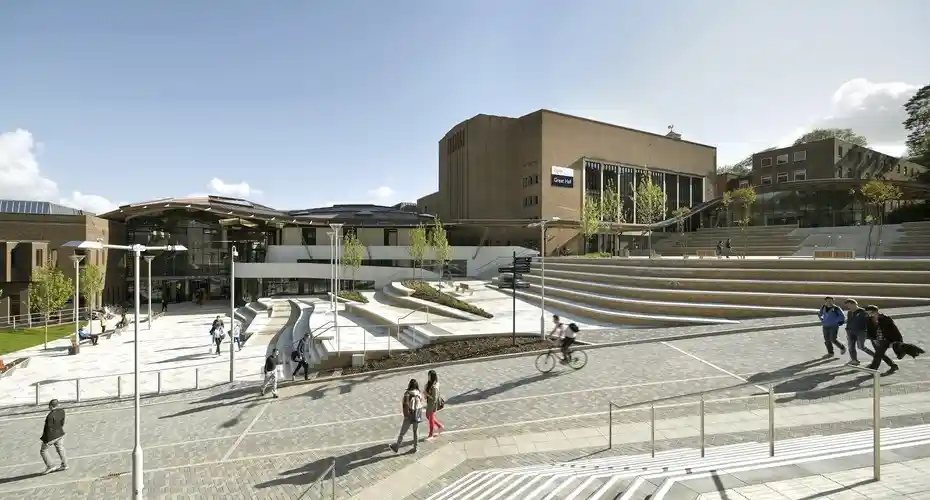| Degrees |
|
|---|---|
| Duration |
| Start date | September or January |
|---|---|
| Location | Streatham Campus |
| Study modes | Full time and part time |
Overview
In the Department of Social and Political Sciences, Philosophy, and Anthropology we offer of a variety of research degrees, from MA by Research, to MPhil, to PhD. Please see here for an explanation of different types of degree available.
In our Department you have the opportunity to undertake advanced postgraduate research in a friendly, interdisciplinary, collaborative, and highly productive community. We have a range of interests that cut across themes in sociology (including criminology), philosophy, anthropology and anthrozoology. We support postgraduate students working across a diverse range of topics in these disciplines and at their boundaries. Our department includes Egenis, the Centre for the Study of Life Sciences, an internationally recognised research centre for philosophical and social studies of the life sciences.
Contact
Web: Enquire online
Phone: 0300 555 6060 (UK)
+44 (0)1392 723044 (non-UK)
![]()
Top 10 in the UK for Philosophy
8th in The Complete University Guide 2025
![]()
Top 15 in the UK for Sociology
Joint 15th in The Times and The Sunday Times Good University Guide 2025
![]()
82% of our research is internationally excellent
Based on research rated 4* + 3* in REF 2021. Our research in Sociology, Philosophy, Anthropology and Criminology was returned to this UoA.
![]()
Internationally recognised for work in philosophical anthropology and the sociology of culture
![]()
Top 10 in the UK for Philosophy
8th in The Complete University Guide 2025
![]()
Top 15 in the UK for Sociology
Joint 15th in The Times and The Sunday Times Good University Guide 2025
![]()
82% of our research is internationally excellent
Based on research rated 4* + 3* in REF 2021. Our research in Sociology, Philosophy, Anthropology and Criminology was returned to this UoA.
Research overview
Some examples of our areas and topics of study are listed below. Visit our research pages and staff profiles for more information about individual research interests.
Sociology
- Science and Technology Studies (STS)
- Sociology of Health and Illness
- Social Theory
- Social Inequalities in Education
- Cultural Sociology
- Political Sociology
- Criminology
- Terrorism
- Ethnography
- Advanced Quantitative Methods
Philosophy
- History and Philosophy of Science
- Philosophy of Mind and Cognitive Science
- Philosophy of Psychiatry
- Social Philosophy
- Ethics
- Philosophical Anthropology
- Phenomenology
- Existentialism
- Critical Theory
- Feminist Philosophy
Anthropology
- Anthropology of Food
- Anthropology of Health and Illness
- Anthropology of Art and Visual Anthropology
- Kinship, Marriage and Gender
- Sound studies
- Wellbeing and the Good Life
- Ritual and Religion
- Cities and Society
- Emotion and Affect
- Regional expertise: Europe, Middle East, Japan, Korea, Africa
Anthrozoology
- Human-Animal Interaction
- Animal Welfare
- Animals as Pets
- Working Animals
- Animal Ethics
- Animal Training
- Ecotourism
- Trans-species communication
- Animals in Religious Belief
- Veterinary Care
Research culture
As a postgraduate student in the Department of Social and Political Sciences, Philosophy, and Anthropology you will be able to pursue your work within a friendly and informal atmosphere.
We pride ourselves on providing an environment for students that will expose you to a wide range of intellectual influences and exciting ideas.
PhD students are also part of the wider College of Social Sciences and International Studies research community and have opportunity to meet with students and staff from other disciplines.
Our research culture is characterised by our commitment to foster thinking and analysis that crosses over traditional academic boundaries (such as between philosophy-sociology-anthropology as well as social sciences-life sciences). The research culture for postgraduate students reflects this spirit.
Postgraduates in the department actively contribute to its research culture by:
- participating in research-related seminars, including departmental seminars, and Egenis seminars
- participating in topic-specific reading groups, led by faculty members and/or PhD students. Examples of ongoing reading groups include: cognition and culture; sociology of diagnosis; science and technology studies; feminist phenomenology (and others)
- organising and presenting at the Department’s annual Postgraduate Conference (see here for the one held in 2019)
- contributing to the organisation of workshops and symposia
- contributing to any other research event, such as attending visiting students’ and staff’s talk, discussions on work-in-progress work, evening film & discussion series, etc.
Further information
You are very welcome to visit the department and talk to potential research supervisors and meet one of our current students. If you would like to do this please contact the Graduate Research Team with a selection of possible dates, your research interests, and any members of staff you would particularly like to meet.
Our small and friendly Postgraduate Open Days offer fantastic opportunities to speak to our staff and current postgraduate students one-to-one so that you can find out more about our individual programmes, about scholarships and funding, and experience our campuses and facilities first-hand. Find out more.
How to apply
You should have a good first degree either in Philosophy or another subject that could prepare you for a research project within the Department.
Requirements for international students
If you are an international student, please visit our international equivalency pages to enable you to see if your existing academic qualifications meet our entry requirements.
English language requirements
International students need to show they have the required level of English language to study this course. The required test scores for this course fall under Profile E: view the required test scores and equivalencies from your country.
Fees and funding
Tuition fees per year 2025/26
- Home: £5,006 full-time; £pro-rata part-time
- International: £23,500 full-time
For those studying for more than one year, our fees are expected to increase modestly in line with Consumer Price Inflation measured in December each year. More information can be found on our Student Finance webpages.
Tuition fees per year 2024/25
- Home: £4,786 full-time; £pro-rata part-time
- International: £22,600 full-time
For those studying for more than one year, our fees are expected to increase modestly in line with Consumer Price Inflation measured in December each year. More information can be found on our Student Finance webpages.
Our Postgraduate Funding webpage provides links to further information. If you are considering a PhD in the future, in addition to University of Exeter funding, we have been successful at securing postgraduate funding for PhD research through our Funded centres.
Current available funding
| Award | Value | Application deadline | Description |
|---|---|---|---|
| University of Exeter Faculty of Humanities, Arts and Social Sciences PhD Studentships in Communications, Drama and Film | Home (UK) or International tuition fees and an annual maintenance allowance at Research Council current rate of £20,780 per year (2025/6 rate) plus additional stipend top-up to help with visa fees and health surcharge costs, where applicable. | Mon 19th May 2025 | Home (UK) or International tuition fees and an annual maintenance allowance at Research Council current rate of £20,780 per year (2025/6 rate) plus additional stipend top-up to help with visa fees and health surcharge costs, where applicable. |
| Women’s Transnational Theatre Networks, 1789-1914 (WOMENTHEATRENET) A UKRI funded PhD studentship in the Department of Communications, Drama and Film | UK and International tuition fees and an annual maintenance allowance at current Research Council rate of £20,780 per year (2025/26 rate) | Mon 19th May 2025 | The research project investigates women’s creative work in the 19th century through a series of case studies of the theatre cultures of Britain, Ireland, Australia, France, and India. The project investigates women’s transnational networks of creative and intellectual work. |
| University of Exeter Alumni Scholarship 2025/26 | 20% reduction in the first year tuition fee | There is no application for this award. You will be automatically considered. | A tuition fee discount for University of Exeter alumni who start a postgraduate degree with us in 2025/26 |
| University of Exeter Class of 2025 Progression Scholarship | 20% reduction in the first year tuition fees | There is no application for this award. You will be automatically considered. | A tuition fee discount for current University of Exeter students completing a degree in 2025 and progressing directly to a standalone postgraduate programme with us in 2025/26 |
Supervision
You can expect:
- High-quality research supervision to develop and nurture your potential
- A tailored supervision approach to help best suit your requirements
- Accessible supervisors who are enthusiastic about working directly with postgraduate research students
- Regular timetabled meetings with your supervisor
- 'Open door' policy to all postgraduate students - instant access to world-leading researchers who will share their expertise and ideas with you
- Regular meetings with your supervisory team, other members of your research group, and mentors
You will only be able to apply for a PhD when you have received a letter from potential supervisors stating that they are willing to supervise your PhD thesis. You therefore need to initiate contact with faculty who are working on topics that you are interested in and present them with a proposal of no more than 2000 words.
Facilities
As a postgraduate student in Sociology, Philosophy and Anthropology, you will be able to pursue your work within a friendly and informal atmosphere. We pride ourselves on providing an environment for students that will expose you to a wide range of intellectual influences and exciting ideas. PhD students are also part of the wider College of Social Sciences and International Studies Graduate Research School and have opportunity to meet with students and staff from other disciplines. The Graduate Research School team also provides a friendly point of contact for any queries you might have about the application process, orientation or life within the School.
Postgraduates in the department actively contribute to its research culture by:
- participating in research-related seminars, including departmental seminars, Egenis seminars, Science and Technology Studies briefings, technical briefings on developments in contemporary biology and the annual College of Social Sciences and International Studies' postgraduate conference.
- organising workshops and symposiums
- producing their own on-line Music and Arts in Action journal
- running intermittent student-only reading groups on the philosophy of science
- taking part in the History and Philosophy of Biology Journal Club
- participating in the Sociology of the Arts Group
![]()
Internationally recognised for work in philosophical anthropology and the sociology of culture











